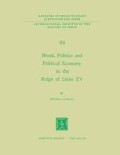Abstract
The government’s inability to stem the generalization and deepening of the crisis at the very end of the decade doomed liberalization. The new Controller-General, Terray, metaphorically portrayed the liberal experience as “the flood” and imagined his responsibility, in part, as channeling the waters back into their natural reservoirs and building dikes capable of withstanding future inundations of any sort. But he did not take a nostalgically antediluvian approach to the task—at least he tried not to. The problem was that de-liberalization did not bring instant recovery. Terray enjoyed virtually no respite from subsistence troubles during his four year tenure and the subsistence troubles generated other political and economic problems which compounded the difficulty for him.
Preview
Unable to display preview. Download preview PDF.
Rights and permissions
Copyright information
© 1976 Martinus Nijhoff, The Hague, Netherlands
About this chapter
Cite this chapter
Kaplan, S.L. (1976). From Political Economy to Police: The Return to Apprehensive Paternalism. In: Bread, Politics and Political Economy in the Reign of Louis XV. Archives Internationales d’Histoire des Idees / International Archives of the History of Ideas, vol 86. Springer, Dordrecht. https://doi.org/10.1007/978-94-010-1404-5_11
Download citation
DOI: https://doi.org/10.1007/978-94-010-1404-5_11
Publisher Name: Springer, Dordrecht
Print ISBN: 978-94-010-1406-9
Online ISBN: 978-94-010-1404-5
eBook Packages: Springer Book Archive

